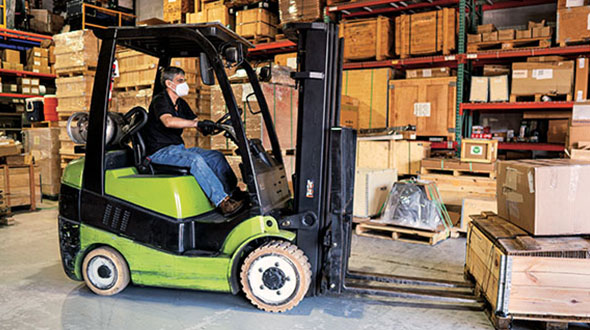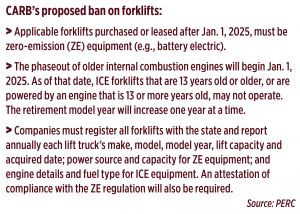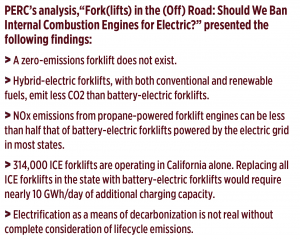PERC examines CARB ban on internal combustion engine forklifts

CARB’s proposed mandate would ban propane-fueled forklifts. Photo: THEPALMER/E+/Getty Images
The Propane Education & Research Council (PERC) released an analysis that debates the California Air Resources Board’s (CARB) proposed ban on internal combustion engine (ICE) forklifts.
CARB’s mandate would ban all internal combustion engine forklifts, including hybrid-electric solutions, only allowing battery-powered and hydrogen fuel cell forklifts.
According to PERC, the efforts began with California Gov. Gavin Newsom’s Executive Order N-79-20, signed in September 2020. CARB proposed its draft regulatory concept in August 2021.
PERC’s analysis – “Fork(lifts) in the (Off) Road: Should We Ban Internal Combustion Engines for Electric?” – compares the lifecycle emissions profiles of propane and electric-powered forklifts, including carbon dioxide (CO2) and nitrogen oxide (NOx) emissions.
The analysis shows that conventional propane engines are superior to electric forklifts in several states. The case for internal combustion engine forklifts becomes even stronger with hybrids and renewable fuels, and nearly all propane ICE forklift technologies emit extremely low criteria pollutants compared to the regulatory standards.
According to PERC, the analysis was conducted using the Environmental Protection Agency’s available certification emissions data comparing lifecycle emissions of CO2 and NOx between propane and electric forklifts.
“Electrification is often extolled to be the only solution to full decarbonization, but people too often overlook how electricity is generated, stored, transmitted and consumed,” says Gokul Vishwanathan, report author and director of research and sustainability at PERC. “A single-energy mandate isn’t sufficient or realistic, and the truth is propane and renewable propane can lead to immediate decarbonization of this sector.”
PERC urges regulatory agencies to conduct detailed emissions lifecycle analyses before considering a ban on specific technologies. The council says an abrupt shift toward zero tailpipe-emission forklifts would be a missed opportunity for accelerating decarbonization using low-carbon fuels, renewables and renewable/low-carbon blends.
“It would be safe to say that California’s goal is singular in focus – force widespread adoption of electric forklifts to eliminate all internal combustion powered variants,” says Jeremy Wishart, director of technical communications at PERC.
The analysis concludes co-optimization of engines and fuels is key to achieving decarbonization. The development of high-efficiency engines, renewable propane and blends of propane and renewable dimethyl ether offer solutions, as well.


















